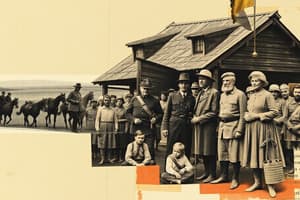Podcast
Questions and Answers
Which of the following events was NOT a direct result of the Kansas-Nebraska Act?
Which of the following events was NOT a direct result of the Kansas-Nebraska Act?
Which of the following statements accurately reflects the impact of the Battle of Gettysburg on the course of the Civil War?
Which of the following statements accurately reflects the impact of the Battle of Gettysburg on the course of the Civil War?
Which of the following BEST describes the significance of the Mississippi River to the Union's strategy during the Civil War?
Which of the following BEST describes the significance of the Mississippi River to the Union's strategy during the Civil War?
How did the actions of Abraham Lincoln contribute to the secession of the Southern states?
How did the actions of Abraham Lincoln contribute to the secession of the Southern states?
Signup and view all the answers
What was the primary reason for the disagreement between the North and the South regarding the expansion of slavery into new territories?
What was the primary reason for the disagreement between the North and the South regarding the expansion of slavery into new territories?
Signup and view all the answers
Which of the following BEST describes the role of the Border States in the Civil War?
Which of the following BEST describes the role of the Border States in the Civil War?
Signup and view all the answers
Which of the following correctly describes the significance of Fort Sumter as a pivotal moment in the Civil War?
Which of the following correctly describes the significance of Fort Sumter as a pivotal moment in the Civil War?
Signup and view all the answers
Ulysses S. Grant's appointment as Commander of the Union Army had a significant impact on the war. What was the PRIMARY reason for his appointment?
Ulysses S. Grant's appointment as Commander of the Union Army had a significant impact on the war. What was the PRIMARY reason for his appointment?
Signup and view all the answers
Flashcards
Civil War
Civil War
A conflict between the Northern states (Union) and Southern states (Confederacy) from 1861 to 1865.
Secession
Secession
The act of 11 Southern states breaking away from the Union to form the Confederacy.
Confederate States of America
Confederate States of America
Government formed by the 11 seceding Southern states during the Civil War.
Border States
Border States
Signup and view all the flashcards
Battle of Gettysburg
Battle of Gettysburg
Signup and view all the flashcards
Fort Sumter
Fort Sumter
Signup and view all the flashcards
Ulysses S. Grant
Ulysses S. Grant
Signup and view all the flashcards
Robert E. Lee
Robert E. Lee
Signup and view all the flashcards
Study Notes
Causes of the Civil War
- Southern states seceded from the Union due to disagreements over states' rights, primarily regarding slavery.
- The issue of slavery intensified as new territories were admitted to the Union.
- Opposition to slavery clashed with pro-slavery advocates.
- Violence in Kansas highlighted the divide. Kansas' entry as a free state fueled Southern concerns.
- Southerners feared President Lincoln would limit their rights and abolish slavery.
- 11 Southern states formed the Confederate States of America.
- Richmond, Virginia, became the Confederate capital.
- Jefferson Davis was the Confederate president.
- Border states (Kentucky, Maryland, Delaware, Missouri) remained divided.
Initial Stages of the Civil War
- The Civil War began on April 12, 1861, at Fort Sumter, South Carolina.
- The conflict marked the deadliest war in US history.
- Early battles like Bull Run I and II, Antietam, and Shiloh resulted in heavy casualties on both sides.
- Neither side gained a decisive advantage.
Turning Point at Gettysburg
- The Battle of Gettysburg (July 1, 1863) became a pivotal moment.
- Confederate forces under Robert E. Lee were driven away from Pennsylvania by Union General George Meade's Army.
- This greatly weakened the Confederate army.
Western Theatre and Union Advance
- Union forces under Ulysses S. Grant secured control of the Mississippi River and New Orleans, dividing the Confederacy.
- Grant's command of the Union Army led to continued and decisive battles against Lee.
- These battles drastically weakened Lee's Army of Northern Virginia.
- General William T. Sherman's "March to the Sea" devastated the Confederate South.
End of the Civil War
- Union forces invaded Richmond, the Confederate capital.
- The Confederate states surrendered at Appomattox Court House, Virginia on April 9, 1865.
- The Union was preserved.
Studying That Suits You
Use AI to generate personalized quizzes and flashcards to suit your learning preferences.
Description
Explore the significant causes that led to the Civil War, including the disputes over states' rights and slavery. Understand the early battles and events that defined the conflict starting from April 1861.


